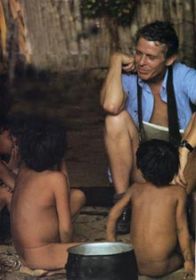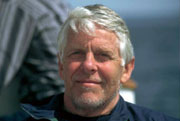|

Robin with Yanomami Children 1981
|
Robin Hanbury-Tenison, OBE, (75) is a Founder and President of Survival International, the world’s leading organisation supporting tribal peoples. 'Named as the greatest explorer by the Sunday Times, he has been on over 30 expeditions, including as leader of the Royal Geographical Society’s largest expedition, taking 115 scientists to study the rainforests of Sarawak. This research and his book, “Mulu: the Rainforest”, started the international concern for tropical rainforests. |
|
On Survival’s behalf he has led several overseas missions, including visiting 33 Indian tribes as a guest of the Brazilian government in 1971; Indians of the Darien in Panama and Colombia in 1972; tribes of the outer islands of Indonesia in 1974 and 1975; leading an investigation into excessive logging in Sarawak in 1988; assessing the status of the indigenous peoples of eastern Siberia in 1992 and 1994; and in NE India in 1995; and of the Bushmen of the Kalahari in 1980 and 2005.
A graduate of Oxford University, he has been a Council Member, and is a Gold Medallist of the Royal Geographical Society; winner of the Pio Manzu Award; an International Fellow of the Explorers Club, Winston Churchill Memorial Fellow, Trustee of the Ecological Foundation and Fellow of the Linnean Society. Among his many publications are: A Question of Survival, 1973; A Pattern of Peoples, 1975; The Yanomami, 1982; Fragile Eden, The Oxford Book of Exploration; Mulu: The Rain Forest; and his two autobiographies: Worlds Apart and Worlds Within.
|
Says Robin: ‘The reason, as a modest person under an immodest exterior, that I can live with being described as 'the greatest explorer of the last 20 years' (Sunday Times 1982, listed between Freddy Laker, entrepreneur, and Jack Nicholson, film actor) and one of the 1000 'makers of the 20th Century' (listed between Dag Hammarskjold and Keir Hardy), is because I have been lucky enough to have been associated with great and relevant causes. I have also consistently been proved right by events, often to the great surprise of those who know me. It is better, as Napoleon said, to be lucky than clever. |

Robin in Labrador 1997
|
In 1969 I was one of the founders of Survival International, which has become the lone sane voice of indigenous people, uncontaminated by outside pressures and so trusted by those it helps, and I have remained at Survival's head ever since.
In 1977/78 I led the RGS Mulu expedition to Borneo. It was the scientific papers that resulted, the articles and my book, Mulu: the Rainforest, which did more to launch global concern for rainforests than anything else.
From 1995-98 I led the British Field Sports Society during its transformation into the Countryside Alliance. This process culminated in the 1997 Hyde Park Rally and the 1998 Countryside March (then the biggest event in London ever), which together changed the political agenda in relation to rural affairs in Britain.
The idea of an organisation to represent tribal people was greeted in 1969 with profound scepticism by most academics and realists, especially those who believed that progress was unstoppable. Most thought the struggle hopeless and the people we cared about doomed to extinction in the near future. We were seen as trying to stop the clock, create human zoos and delay progress. The 70s oil crisis and the views of planet earth from space helped to concentrate peoples' minds, but it was not until the tribal people themselves started to take control of their own affairs that global consciousness began to change. Now, from the USA to New Zealand and from Africa to the Arctic, people are being given their land back and receiving compensation for the sins of the past. Too little, too late, but at least something at last.
In the twenty years since Mulu the rate of destruction of the world's forests has accelerated so dramatically that the end is in sight. My return to Mulu in 1998 showed me that the time has come to stop tilting at windmills and feeling better by protesting without success at all that has gone wrong. Now our only hope is to take part in helping to save what is left, restore what has been damaged and make sure that, if we are not too late, it never happens again. Sustainable Forestry Management, a company of which I am a Founding Director, may be the answer.
The criteria that apply to saving the British countryside are the same as those that will save the global environment. Only if man and nature work together can we put the planet back together again. Solutions that do not involve the inhabitants of a region, be they indigenous or immigrant, will never succeed. Man's efforts at environmental control and development will fail if they do not follow sound ecological principles. A working, sustainable planet is the big picture, just as the idea of a working, sustainable countryside struck such a chord in Britain.'
Taken from www.travelintelligence.net |